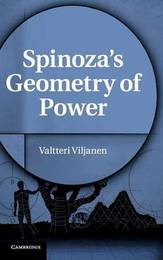
|
Spinoza's Geometry of Power
Hardback
Main Details
Description
This work examines the unique way in which Benedict de Spinoza (1632-77) combines two significant philosophical principles: that real existence requires causal power and that geometrical objects display exceptionally clearly how things have properties in virtue of their essences. Valtteri Viljanen argues that underlying Spinoza's psychology and ethics is a compelling metaphysical theory according to which each and every genuine thing is an entity of power endowed with an internal structure akin to that of geometrical objects. This allows Spinoza to offer a theory of existence and of action - human and non-human alike - as dynamic striving that takes place with the same kind of necessity and intelligibility that pertain to geometry. Viljanen's fresh and original study will interest a wide range of readers in Spinoza studies and early modern philosophy more generally.
Author Biography
Valtteri Viljanen is a Postdoctoral Fellow at the University of Turku, Finland. He is co-editor (with Juhani Pietarinen) of the anthology The World as Active Power: Studies in the History of European Reason (2009) and the author of a number of journal articles on Spinoza's philosophy.
Reviews'Viljanen rescues Spinoza's metaphysics from interpreters who push too hard in domesticating his radical ideas. In building his interpretation, he makes excellent use not only of Spinoza's text, but also of scholarship in medieval philosophy and contemporary metaphysics. The breadth and depth of his study are impressive.' Charlie Huenemann, Utah State University 'In this book, Valtteri Viljanen develops a very lucid study of the fundamental role the concept of power plays in Spinoza's system ... Viljanen's book is one of the best books on Spinoza's metaphysics written in English since [A] Study of Spinoza's Ethics, published by Bennett in 1984. Moreover, like Bennett's book, Viljanen's is such that even though one can disagree (or agree) with its thesis as much as one likes, clearly this is a work that cannot be ignored.' Mogens Laerke, translated from Archives de Philosophie
|